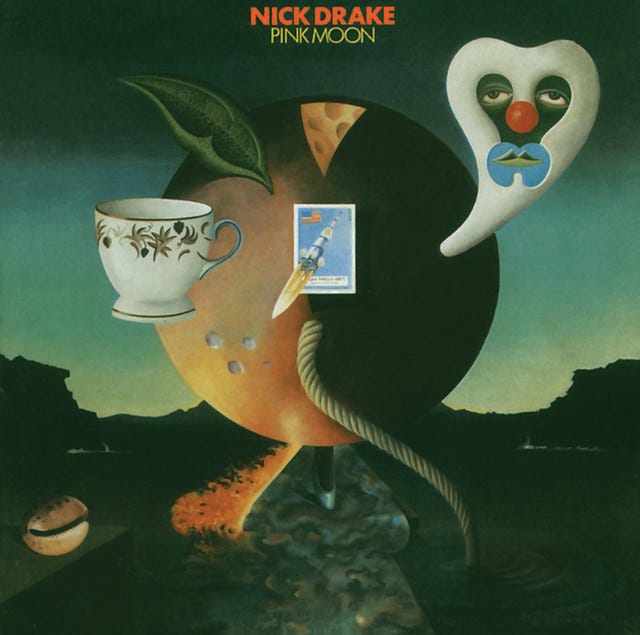Genre of the Day - Singer-Songwriter
Album of the Day - Pink Moon by Nick Drake (1972)
April 2, 2024
Does a single characteristic justify genre classification? In my interrogation (such an academia word, Jesus) of the concept of music genres, I’ve found that there’s no common thread defining the concept. It is nebulous and abstract. Singer-songwriter on the surface seems more a simple it-is-or-it-isn’t characteristic of music: the singer wrote the song they’re singing. Not exactly rare, and not exactly cohesive. No manner of music exists within a vacuum, though, and to understand why the concept of a singer-songwriter is so revolutionary, we have to peer into the recent history of western pop music. The relationship between a singer’s song and whether they wrote it or not is still key to fan’s perceptions of musical quality today. For some, the act of songwriting inherently elevates any song. For others, a deft vocal cut of a song can enhance it more. This shapes a ton of pop discourse today, especially looking at who’s the pop music juggernaut at the moment. Taylor Swift is well known for pushing her pen, writing every song she owns since her precocious debut. She makes pop records that smash the charts as nimbly as she shares confessionals, and it’s been the centerpiece of her appeal.
Being able to do both is not an easy feat, nor was it much of a possibility in commercial music in the mid-20th century. With the American recording machine up and running by the 1930s, the name of the game was vocal interpretation. Songwriters would pen the song, and a singer would take the torch and run to the finish line with it. This synergy is seen by many as one reason why some older music may feel more timeless, because each part of the operation was putting so much thought into what they did best. Singers weren’t expected to be confessional: it simply wasn’t their role. The phrase often goes that those who can’t, teach. Thus, those who couldn’t sing well enough to be commercially viable sat at the desk and wrote. Those who couldn’t write songs well enough to sell records sung.
Singing and songwriting is a seizing of the reins and the idea that a voice has to be commercially viable to be the one delivering the lyrics. That’s why singer-songwriter artists are integral to counterculture: it goes against the music industrial idea of what functions best, allowing for more organic experimentation. A voice’s roughness around the edges enhances the music because they’re telling their story. Simple enough. But even just as a conjunction between the music’s creation and the music’s delivery, the genre obviously carries baggage from its origins. Because it developed out of the folk revival of the mid-20th century, there’s certain characteristics to be expected of early records classified as singer-songwriter: less adorned, bombastic vocals, an emphasis on the portable, no-studio-magic-required guitar or come-as-you-are piano, and that vague notion of authenticity.
Nick Drake embodies all of these hallmarks perfectly. Released as his last album before he took his life, Pink Moon is the lyrical sound of a man who already seems to have crossed to the other side of that decision. A pink moon is a bit of a feint. It’s an April moon, the symbol of spring. He’s contemplative, ruminating on nature, but the impulse is clear: cross over to a beyond, remarking on “Road” that he “can take a road that’ll see me through”, to me a continuation of the inevitability of death on title track “Pink Moon”. A lot of these songs are as cryptic as they are stunning, his densely masterful guitar playing shifting attention away from the austerity of the lyrics at times. It’s that synergy that drives us to seek out songwriters specifically, though: we never know quite what they meant, but each piece of the music flowed through the channel of the individual. It’s like reading a memoir rather than a biography: words from the source, a piece of their life broken off and bestowed unto you.




